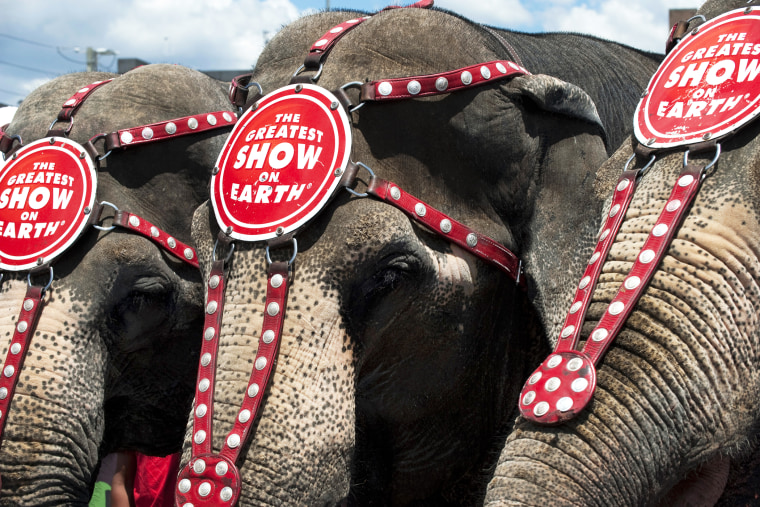In a significant victory for the animal rights movement, Ringling Bros. and Barnum & Bailey Circus announced yesterday that it will phase out the use of elephants in its circuses by 2018.
For many years, Ringling has been targeted by People for the Ethical Treatment of Animals. On PETA’s website, you can see undercover video of a sharp metal-tipped bullhook being sunk into sensitive parts of the elephants’ body. A head trainer tells circus workers hit them hard to “make ‘em scream!” Particularly heart-breaking is the footage of baby elephants, removed from their mothers and then tied, chained and abused, so as to break their spirit, to make it possible to train them to perform unnatural and grotesque circus tricks.
RELATED: Ringling Bros. ending elephant acts over animal treatment concerns
When not performing or being trained, circus elephants -- their bodies evolved for walking long distances through the jungle or across the plains -- are chained in boxcars or arena basements. Over the decades they develop painful arthritis.
"When not performing or being trained, circus elephants — their bodies evolved for walking long distances through the jungle or across the plains — are chained in boxcars or arena basements."'
Why are we doing this to these sensitive, intelligent, long-lived social animals? Dr. Mel Richardson, a veterinarian with 40 years experience with elephants, puts it this way: “The amount of suffering those elephants go through, in order to entertain anyone’s child for 15 minutes, is a crime.”
There are many ways of entertaining our children. We don’t need to choose one that involves abusing animals. We can congratulate Ringling Bros. and Barnum & Bailey Circus on their decision, and hope all other circuses using elephants will soon follow their example. Nevertheless, three more years is too long. Why can’t the elephants go to a sanctuary right now?
It’s true that this victory for animals is only going to affect a handful of them. It matters, though, not only for the elephants, but because it shows that the animal rights movement is getting through to people. Alana Feld, the circus company’s executive vice-president, has said, “There’s been something of a mood shift among our consumers. A lot of people aren’t comfortable with us touring with our elephants.”
It’s now 40 years since I wrote "Animal Liberation." People often ask me if the animal rights movement has made progress in that time, but it’s only people who were not around in 1975 who ask that question, because in 1975 there was no animal rights movement. The difference in attitudes is enormous. Practical change that improves the lives of animals has been much harder to achieve, but it is happening too.
Most remarkable is the way in which the movement has challenged the huge agribusiness industry, forcing producers of meat and eggs across the entire European Union – all 28 member nations, from the United Kingdom to Greece, from Portugal to Poland – to give hundreds of millions of hens and pigs and veal calves more space and conditions better suited to their needs. And on Jan. 1 this year, it became illegal in California to keep pigs or calves in crates too narrow for them even to turn around, or to raise laying hens crammed into wire cages too small for them to stretch even one wing. That reform is another sign of changing attitudes, following on the heels of an overwhelming victory for animal advocates in a state-wide referendum in 2008.
The California standards are not enough to give farm animals a good life, but they are a marked improvement on what is still happening in other states. Now the most urgent need is to bring the entire nation up to those standards.
RELATED: Gov. Christie vetoes pig gestation crate ban
Something else remarkable happened in 2008. For the whole of the twentieth century, the U.S. had the reputation of being a nation of meat eaters. Consumption of meat just kept going up and up, with just one or two small blips for events like the great depression of the 1930s. Beef consumption peaked in the mid-1970s, but a sharp increase in the amount of chicken eaten more than made up for that drop. Then in 2008, total meat consumption, including poultry, fell, and it has fallen again every year since.
No one quite knows why. Yes, there are more vegetarians and vegans than ever before – if you used the term "vegan" in the 1970s, you got a blank look and had to explain what the word meant. But probably what is making a bigger difference is the "Meatless Monday" movement, with school districts, major caterers, and other food service outlets serving alternatives to meat, and tens of millions of Americans eating something other than meat on at least one day per week.
Whatever the cause, the change is good for animals, good for the environment, and good for our health. I believe, too, that once people see that they don’t have to eat animals, attitudes to all forms of animal abuse will change even more rapidly.
Peter Singer is professor of bioethics at Princeton University, and the author of "Animal Liberation." His next book, "The Most Good You Can Do," will be published on April 7.
